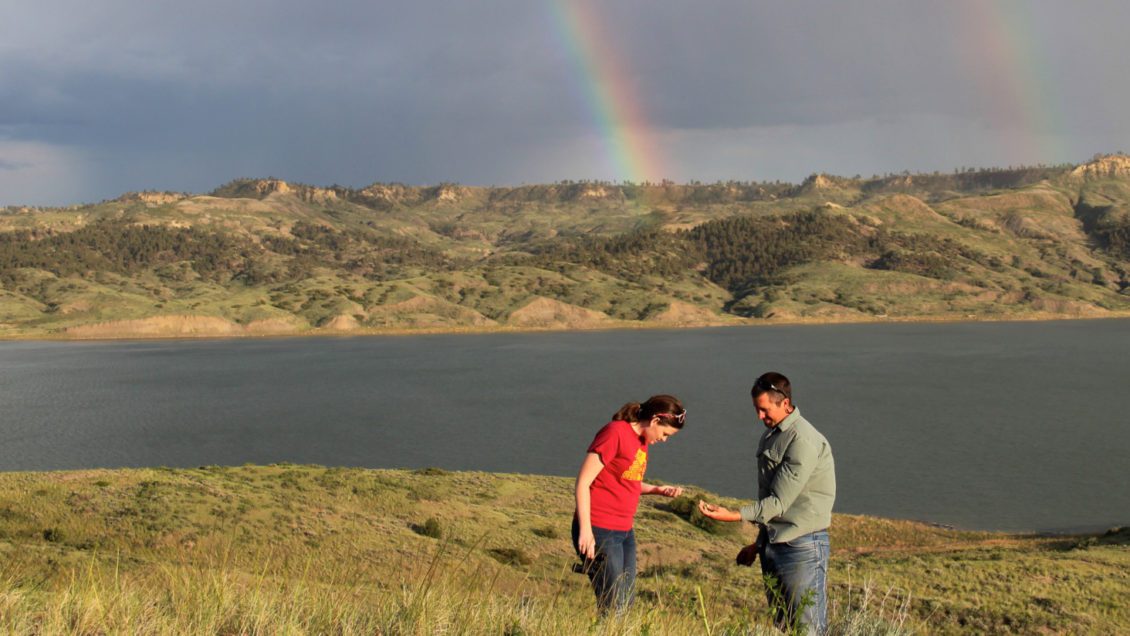CLEMSON — A pair of scientists working to foster wildlife and natural resources conservation in South Carolina and beyond have garnered recognition as this year’s top researchers in Clemson University’s College of Agriculture, Forestry and Life Sciences (CAFLS).

David Jachowski and John Rodgers, faculty members in the forestry and environmental conservation department, were recently named CAFLS Researchers of the Year.
“The work of Drs. Jachowski and Rodgers is the embodiment of the research efforts that are such an integral part of Clemson’s land-grant mission of solving problems and creating prosperity in South Carolina through teaching, research and Extension,” said Dean Keith Belli. “Because agriculture and natural resources are at the very heart of why land-grant institutions were created, CAFLS treats that calling with the utmost importance. I congratulate both David and John on their outstanding efforts in that regard.”
Jachowski, an assistant professor of wildlife ecology, conducts research that addresses the themes of adaptation and restoration, focusing on three main topics in wildlife ecology: mammals in the changing world, restoration of wildlife populations and community ecology of carnivores. He conducts field-based research projects on these topics in the Great Plains, where he created and runs the Clemson Prairie Ecology Lab; South Africa; and the southeastern United States.

“Since my arrival at Clemson five years ago, I have taken the responsibility of helping address current wildlife management challenges in South Carolina very seriously,” Jachowski said. “Fortunately, given Clemson’s talented group of current faculty and longstanding cooperative working relationship with state’s Department of Natural Resources, this has been a relatively easy transition to make in my career.”
During his time at Clemson, Jachowski has published two books, four book chapters and 26 peer-reviewed journal articles; recruited and advised 21 graduate students; and has been the principal investigator or co-principal investigator on 25 external grants worth in excess of $3.2 million.
“Clemson has provided a tremendous platform for young faculty to not only develop strong research programs in South Carolina, but through the reputation and resources of the university do research projects around the world,” he added. “I have been fortunate enough to develop research projects in Southern Africa, India and a field station in the Great Plains that help Clemson conduct research that has a global impact.”
Rodgers, director of Clemson’s Ecotoxicology Program, conducts research focused on aquatic toxicology and water quality, including adaptive and comprehensive management of critical water resources. Specifically, Rodgers studies the effects of toxic chemicals such as pesticides and effluents on aquatic ecosystems and designs and implements constructed wetlands to decrease environmental and ecological risks.

“Protecting, conserving and rehabilitating our environment, particularly our precious freshwater resources, are crucial to the land-grant mission in CAFLS,” Rodgers said. “My research has focused on impaired water resources throughout the state, nation and the world. Along with students and colleagues, I have tackled issues ranging from legacy pollution to emerging contaminants such as algal toxins. The research approach involves accurate ecological risk assessments coupled with risk mitigation by putting biogeochemistry to work, and the research continues through more than 100 graduate students and numerous colleagues throughout the world.”
Rodgers has published more than 150 peer-reviewed scientific papers and book chapters and several books, with a Google Scholar Index of 37. He serves as a scientific adviser to the U.S. Environmental Protection Agency, the Aquatic Ecosystem Restoration Foundation and the National Council for Air and Stream Improvement. He recently won an award from the U.S. Department of Energy for research on risk mitigation in wetlands and received a lifetime achievement award from Lonza Inc., for his research on restoration of aquatic ecosystems.
“Conserving wildlife and natural resources is among the foremost goals of our research efforts in CAFLS,” said Paula Agudelo, associate dean of research and Clemson Experiment Station director. “The core of our job is to improve the quality of life for people in South Carolina, the United States and the world, and the research being conducted by Drs. Jachowski and Rodgers epitomizes that mission.”
Agudelo said Jachowski and Rodgers will be nominated by the college for the Clemson University Researcher of the Year Award.
Get in touch and we will connect you with the author or another expert.
Or email us at news@clemson.edu

